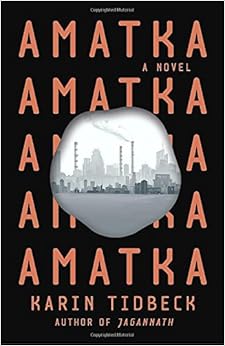Vanja emptied a box of pencils, lined them up on the shelf, and pointed at them one by one. "Pencil, pencil, pencil."
It wasn't long before the words flowed together. "Pencil-pencil-pen-cilpen-cilpen-cilpen-cilpen-cilpen--"
The last pencil in the row shuddered. As Vanja bent closer to look, the shiny yellow surface whitened and buckled. Then, suddenly and soundlessly, it collapsed into a pencil-shaped strip of gloop. Vanja instinctively shrank back. Her stomach turned. She had done it. She had said the wrong name, and the pencil had lost its shape.
In Amatka, as with the three other colonies that exist in the whole world, language keeps things together. Not metaphorically, but literally: good citizens are reminded to frequently "mark" their belongings, both with writing and with speech, so that they remain intact. Doors say DOOR, shoes say SHOE. Vanja, a visitor from the capitol researching the locals' usage of hygiene products, is more careless than most. In the first week of her visit to Amatka, she lets both her toothbrush ("TOOTHBRUSH") and her suitcase ("SUITCASE") dissolve into gloop. It's suggested that someone who lets things fall apart that way has, deep down, a resentment toward the current order of things.
In many ways, Amatka is a conventional dystopian novel. Vanja slowly comes to feel alienated by the repressive nature of the world government, which manages the lives of its citizens with a heavy hand and a close-watching eye. But the odd circumstances give a heightened urgency to a tired plot. If allowing laziness or subversion means the world will dissolve into gloop, aren't a heavy hand and a close-watching eye what's required? Vanja is reminded that the committees are elected positions, and represents the will of the people to keep the community thriving.
Despite its clever premise, Amatka took a long time to catch my interest. Vanja's story checks off a lot of the familiar boxes: a hidden past trauma, a sudden love affair. It's notable that her love affair is with Nina, and that the book makes no special fanfare about the centrality of a lesbian relationship. After all, reproduction in Amatka is divorced from its romantic and familial trappings: Nina and her male friend Ivar have children who spend the week at the Children's House, and the time they spend together on weekends seems more like duty than love. Doing this allows Tidbeck to dismiss the historical pressure that we might expect to be exerted on a gay relationship in a repressive, community-oriented society, but it doesn't exactly make it seem more repressive, or more interesting. And it certainly doesn't help that Nina's single noteworthy quality is a slavish sense of duty toward the community--which isn't a characteristic so much as an obstacle for the plot.
For most of its length, Amatka is weird, but not really weird enough. I couldn't help thinking about Philip K Dick's evocative "gubbish," which is so much more terrifying than "gloop." But by the end, when Tidbeck really lets shit get strange, I liked it more: A series of pipes and tunnels begin appearing, as if by magic, around Amatka. Vanja deduces that a famous poet who left Amatka years ago with a band of 100 disillusioned citizens has returned, to save the colony from itself. The poet knows that when you free yourself from repressive ideas of language--from the idea that words and their objects are inherently linked, and that words themselves can be pinned down dictionary-style--you can do almost anything. And then you can speak pipes and tunnels into being, and change the very fabric of reality, the very fabric of your own being. This notion leads to some really terrific, chilling scenes of visual sci-fi-horror. The ending doesn't totally land, I think, but Amatka works because it finally trusts its own message.


No comments:
Post a Comment